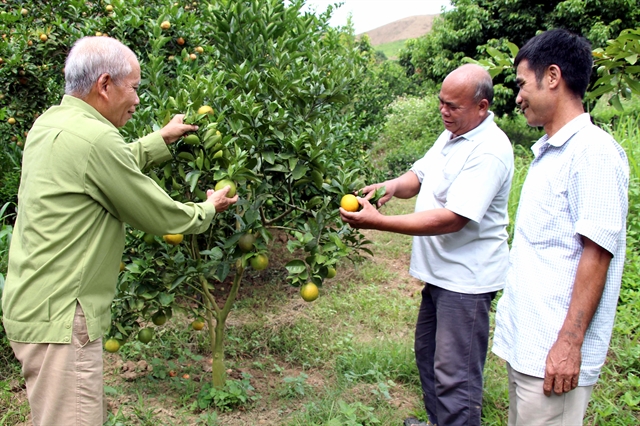.jfif) Opinion
Opinion

Deputy chairman of the Việt Nam Association of the Elderly Central Committee Nguyễn Hòa Bình speaks to Việt Nam News Agency about the elderly and their labour needs.

|
| Elderly people share experience on planting fruit trees in the northern mountainous province of Sơn La. — VNA/VNS Photo Diệp Anh |
Deputy chairman of the Việt Nam Association of the Elderly Central Committee Nguyễn Hòa Bình speaks to Vietnam News Agency about the elderly and their labour needs.
Could you elaborate on the current situation of the elderly?
Việt Nam has more than 11.47 million elderly people, accounting for 12 per cent of the population. More than 7.66 million of them live in rural areas accounting for 65 per cent. More than 1.81 million people receive a monthly allowance; more than 1.4 million elderly people receive allowances for people with great contributions to the nation and 3.1 million elderly people receive pensions and social insurance benefits.
With care from the Party and State, the Law on the Elderly took effect on July 1, 2010. Accordingly, many guidelines and policies on the elderly have been brought into play, and the elderly's life has also improved.
But the majority of the elderly do not have savings, are on low incomes, and many have to rely on their children and grandchildren. Many people are single and lonely, which needs the support of the community and society.
To improve the elderly’s life quality, on December 21 last year, Prime Minister Phạm Minh Chính issued Decision No 2156/QĐ-TTg approving the National Action Programme for the Elderly for 2021-30.
The programme sets out several tasks and solutions such as medical assistance and healthcare for the elderly, as well as developing a network of social assistance organisations providing care and rehabilitation services for the elderly.
It also gives them vocational education, job introductions and livelihood support, and housing, while assisting them to participate in cultural, sports and tourism activities. It promotes the role of the elderly and helps them access information technology.
The specific target in 2022-25 is for 95 per cent of the elderly to have health insurance, and at least 90 per cent to receive timely primary health care, periodical health checks, and health monitoring records.
Every year, at least 80 per cent of elderly people with difficult lives can access health services in various forms; 70 per cent of elderly people with disabilities are screened and receive rehabilitation; 10,000 elderly people with difficult lives and no caregivers receive appropriate care and assistance at social assistance facilities.
One of the most important measures of the action programme is to support vocational education, job introduction and livelihood support and housing for the elderly.
The State will promptly implement primary healthcare, periodical health checks, and set up a management book to monitor the elderly’s health at the commune level.
It will give priority to the elderly over 80 years old, and gradually expand to those who are 65 years and older. It will provide medical examinations and treatment at home for the elderly who cannot afford to go to medical stations.
It will support the pilot model of long-term care for the elderly, and a model of social housing for single, lonely and elderly people.
What are the labour needs of the elderly?
The elderly are a very important resource in the country’s socio-economic development and security. Responding to the Party and State’s policy, the association launched a patriotic campaign "The elderly - Bright example" encouraging the elderly nationwide to actively participate in economic development.
It helps the elderly to exchange and learn from experience in doing business effectively. Many elderly members apply scientific and technical advances and new technologies to the production and creation of high-value goods.
Their economic activities have contributed to creating jobs and incomes for workers, contributed to the local budget, and participated in poverty reduction.
Nearly 400,000 elderly people are recognised as good workers; over 90,000 elderly people are continuing to contribute experiences to businesses and farms. In addition, over 1.1 million elderly people are participating in social activities at the grassroots.
Especially during the COVID-19 pandemic, elderly people everywhere have upheld their exemplary spirit, responsibility, and participated in pandemic prevention and control.
During social distancing, the elderly volunteered to be on duty, supporting forces to instruct people to raise the spirit of fighting the pandemic.
How are the elderly accessing jobs and livelihoods?
Most elderly people worked at State agencies. When they retire, their incomes decrease but they still have to pay for living expenses, healthcare, and others things, so they still need jobs to have additional income.
People of working age can go to job promotion centres, but at present, elderly people cannot find jobs suitable to their health and experience. To get a job, most of them have to go through social relationships.
Therefore, creating jobs for workers after retirement is an important issue that needs to be addressed. The Government's policies also need to take into account the issue of "starting a business" for elderly workers.
The State should have a policy on how to use elderly workers according to their health and experience. It is necessary to introduce and re-train the elderly for suitable occupations. VNS




